- Home
- Gregory Maguire
Mirror Mirror Page 2
Mirror Mirror Read online
Page 2
“Mirror, mirror upon the wall, Who is the fairest fair of all?”
And the mirror answered —
“O Lady Queen, though fair ye be, The young Queen is fairer to see.”
Oh! How angry the wicked woman was then, and so terrified, too, that she scarcely knew what to do. At first she thought she would not go to the wedding at all, but then she felt that she could not rest until she had seen the young Queen. No sooner did she enter the palace than she recognized little Snow-White, and could not move for terror.
Then a pair of red-hot iron shoes was brought into the room with tongs and set before her, and these she was forced to put on and to dance in them until she could dance no longer, but fell down dead, and that was the end of her.
THE END
© Grimm’s Fairy Tales. Translated by L.L. Weedon. London: Ernest Nister, [1898], pp. 9-20.
I am a girl who did no wrong
I am a woman who slept with my father the Pope
I am a rock whose hands have appetites
I am a hunter who cannot kill
I am a mercenary with the French disease
I am a girl who lived among stones
I am a woman who poisoned my enemies
I am a rock and my brothers are rocks
I am a cleric who trafficked in curses
I am a gooseboy or am I a goose
I am a girl who did little wrong
I am a gooseboy or am I a boy
I am a farmer who stole something sacred
I am a monster who let the child go
I am a dog with an unlikely past
I am a hunter who followed the coffin
I am a girl who did something wrong
I am the other side of snow
I am a mirror a mirror am I
Mirror mirror on the wall
Who is the fairest one of all
DO PEOPLE say that I am both your father and your lover? Let the world, that heap of vermin as ridiculous as they are feeble-minded, believe the most absurd tales about the mighty! You must know that for those destined to dominate others, the ordinary rules of life are turned upside down and duty acquires an entirely new meaning. Good and evil are carried off to a higher, different plane. . . .
Remember this. Walk straight ahead. Do only what you like, as long as it is of some use to you. Leave hesitation and scruples to small minds, to plebeians and subordinates. One consideration alone is worthy of you—the elevation of the House of Borgia, the elevation of yourself.
—Alexander VI’s speech to Lucrezia Borgia, from Arthur de Gobineau’s Scènes historiques de la Renaissance (1877), as quoted in The Borgias by Ivan Cloulas (1989)
ONE DAY some Lombard masons working near the cloister of Sta. Maria Nuova just off the Via Appia had opened a sarcophagus and found the body of a young Roman woman of about fifteen, so well preserved that it seemed alive. A crowd had gathered around and admired the girl’s rosy skin, her half-open lips revealing very white teeth, her ears, her black lashes, dark, wide-open eyes, and beautiful hair, done in a knot . . .
—The Borgias, ibid.
The roofs of Montefiore
FROM THE arable river lands to the south, the approach to Montefiore appears a sequence of relaxed hills. In the late spring, when the puckers of red poppy blossom are scattered against the green of the season, it can look like so much washing, like mounds of Persian silk and Florentine brocade lightly tossed in heaps. Each successive rise takes on a new color, indefinably more fervent, an aspect of distance and time stained by the shadows of clouds, or bleached when the sun takes a certain position.
But the traveler on foot or in a hobble-wheeled peasant cart, or even on horseback, learns the truth of the terrain. The ascent is steeper than it looks from below. And the rutted track traverses in long switchbacks to accommodate for the severity of the grade and the crosscutting ravines. So the trip takes many more hours than the view suggests. The red-tiled roofs of Montefiore come into sight, promisingly, and then they disappear again as hills loom up and forests close in.
Often I have traveled the road to Montefiore in memory. Today I travel it in true time, true dust, true air. When the track lends me height enough, I can glimpse the villa’s red roofs above the ranks of poplars, across the intervening valleys. But I can’t tell if the house is peopled with my friends and my family, or with rogues who have murdered the servants in their beds. I can’t tell if the walls below the roofline are scorched with smoke, or if the doors are marked with an ashy cross to suggest that plague has come to gnaw the living into their mortal rest, their last gritty blanket shoveled over their heads.
But I have come out of one death, the one whose walls were glass; I have awakened into a second life dearer for being both unpromised and undeserved. Anyone who walks from her own grave relies on the unexpected. Anyone who walks from her own grave knows that death is more patient than Gesù Cristo. Death can afford to wait.
But now the track turns again, and my view momentarily spins back along the slopes I’ve climbed so far. My eye traces the foothills already gained, considers the alphabet of light that spells its unreadable words on the surface of the river. My eye also moves along the past, to my early misapprehensions committed to memory on this isolated outcropping.
The eye is always caught by light, but shadows have more to say.
Rest. Breathe in, breathe out. No one can harm you further than death could do. When rested, you must go on; you must find out the truth about Montefiore. Granted a second life, you must find in it more meaning than you could ever determine in your first.
• 1502 •
The name of the world
THE WORLD was called Montefiore, as far as she knew, and from her aerie on every side all the world descended.
Like any child, she looked out and across rather than in. She was more familiar with the vistas, the promising valleys with their hidden hamlets, the scope of the future arranged in terms of hills and light.
Once a small dragon had become trapped in the bird-snaring nets slung in the uccellare. Bianca watched as the cook’s adolescent grandson tried to cut it down and release it. Her eyes were fixed on the creature, the stray impossibility of it, not on the spinney in which it was caught. How it twitched, its webbed claws a pearly chalcedony, its eyes frantic and unblinking. (Despite the boy’s efforts, it died, and his grandmother flayed it for skin with which to patch the kitchen bellows.)
Bianca regarded visitors to Montefiore with fierce attention: emissaries of the world. But the bones of her home—the house itself—remained as familiar and unregarded as her own fingernails.
Montefiore was larger than a farmer’s villa but not so imposing as a castle. Too far from anywhere important to serve as a casale—a country house—it crowned an upthrust shoulder of land, so its fortifications were natural. On all sides, the steepness of the slope was a deterrent to invaders, and anyway, Montefiore wasn’t large enough to interest the condottieri who led their small armies along the riverbank on one campaign or another.
Had Bianca an adult eye, she might have guessed from its mismatched roofs and inconsistent architectural details that many owners had lived here before her family arrived, shaping the space with a disregard for symmetry or loveliness. When its masters had had money, they’d made attempts to drill a little grandeur into the old stone hull, like crisp starched lace tied under the wet chins of a drooling nonna. A recently completed interior courtyard, handsomely done with columns and vaults in the revived archaic style, provided relief from the roaring breeze.
Except for the courtyard, though, most attempts at improvement had been abandoned in mideffort. Some windows were fitted with glass, but in most windows, squares of linen had been nailed to the shutter moldings, pale light conferring a sense of height and volume to the dark rooms. Along one retaining wall, a loggia ran unevenly, its walls inset with terrazzo putti whose faces had become bubonic with the remains of insect cocoons. For half a century the chapel had stood with a roof be
am and naked struts, the old cladding and tiles having been swept away in an arrogant gale. When the January tramontana blustered in, the geese sometimes sheltered there from the wind, though they seldom took communion.
Fortunately too inaccessible to garrison an army, Montefiore was nonetheless valuable as a lookout. From time to time in its history it had been commandeered for its prospects. On a clear day one imagined one could glimpse the sea.
What child does not feel itself perched at the center of creation? Before catechisms can instill a proper humility, small children know the truth that their own existence has caused the world to bloom into being. The particular geography of home always charms, but the geography of Montefiore was unarguably pastoral. The arrangement of Tuscan and Umbrian vistas, draped from the very threshold of home through diminishing folds to the horizons, taught soft blues and browns to Bianca de Nevada. That was what they were there for; this brown, that blue; this here, that there.
These moments, more or less, had their flashing existence, circa 1500 anno Domini, though the name of a year means little to one who doesn’t yet know the name of corruption.
Lago Verde
THERE WERE the grapes to harvest, the sweeter first olives and the richer late ones, and the second cutting of hay to manage before an early frost sapped it of life. But the weather, this year, was benign, and the agricultural operations around Montefiore were conducted without delay, each in its time. Therefore, the cook’s augury of chicken livers predicting success, Vicente de Nevada organized a corpus of laborers to continue work on ditch digging at the far end of the green lake.
Still considered an unacceptable landlord—for the Spanish slant to his otherwise serviceable Italian—de Nevada was tolerated but not admired. Well, he was new in the district still, only these few years, having arrived from the suspicious unknown with a motherless child and a writ of occupancy sealed in a plum-colored wax. He was a quiet man and a gentle one, and his passions, as far as the locals observed, didn’t show in a manly, obvious way upon his face; so he wasn’t admired. Who could take the time to study a man whose face was the same in winter or summer, in prayer or labor, on feastday or, presumably, at an auto-da-fé in his homeland, Spain? No, Vicente wasn’t admired, but he was tolerated: he saw to it that the sick were tended, the dead blessed by the priest attached to Montefiore, and the wheat shared out and the apples in their time, and the joiner paid for his labors when a coffin had to be built.
Vicente de Nevada loved his small holding, and since the weather was cooperating and the work crew needed encouragement, he pulled off his shirt and got hip-deep in the swampy water at the lake’s draining edge. He helped to unsettle boulders that had rolled into the mud back in the time of Potiphar.
“Go on, assist the good man, you lazy cleric,” said Primavera Vecchia, the cook.
“It wouldn’t be seemly,” said Fra Ludovico calmly. “If you think he needs help, do it yourself.”
“I’m watching the child.”
“Leave her in my watch.”
“What a mistake that would be. She’d wander up to her nose in the green water and drown before your eyes, while you tiptoed around squealing for an angel to come to her aide. I’d no more leave her in your care than I would my own soul.”
“Hmmmph,” said Fra Ludovico. “I’ve never been persuaded you had much of a soul. More like a little damp anchovy stuck between your breasts, trying to breathe. That’s what you smell like, anyway.”
The small girl balanced on the margin of the moment, toes in the water and heels in the mud. She was thinking that from the house, the small lake did look green, because regular flooding made the poplars stand knee-deep in water. But from here, on site, with the sun sliding westward, the water looked silvered, and there were flicking scales of sky blue and white as well as poplar green and an uncertain black.
The reflections speckled her pale skin. She stopped to ruck her tunic a few inches higher. It was tied in a knot in back, with a vague hope of keeping it dry, but its hem was dripping.
Bianca was interested in everyone’s splashing. She had listened carefully about the plan to irrigate a field farther along the slope by draining this wetland above. Her father grunted, holding the small of his back, sweating between the shoulderblades. In formal and courteous words he encouraged the workers. They grunted in mockery, equal parts affection and brave disrespect.
He was the world to her, more than the house was, even.
He felt her looking, and with his unvarying expression he turned and waved. It was that, and that alone, that kept the workers at their task. They would have preferred him on the bank, supervising, upbraiding them. But a man who would pause to wave at his daughter, even if his face didn’t change—well, that was a gesture they could read. All together now, and lift. Lift.
What did they know of how he cuddled her and protected her, of how he sat by her cot at night so she could sleep, of how quickly he started when a bad dream woke her? What did they know of the disagreements he had had with Primavera, who wanted to take the child to her pallet in the kitchen? They knew nothing of any of this.
She wanted to walk across the water to him, to run on its mosaic of reflections, for even across this glassy space she missed him. She cried out, selfish thing—don’t disturb the man while he tries to shrink a lake—but her voice came out as a laugh across the water, no more precise than the call of a bird. He waved again.
“Come here, bambina, your behind is mucky,” said Primavera, pulling herself off the rotting log on which she had sat.
“You’ve left a dent in this log,” observed Fra Ludovico kindly.
Bianca skipped on along the lake edge, making the old cook cross, and, with pins in her shins, she hobbled after.
“Papà, Papà,” babbled Bianca.
“Don’t come down this way,” said her father. “We don’t know which is the keystone boulder. When we’ve shifted the right one, the rest will give way, and the force of the water might be strong. Primavera, aren’t you minding her?”
“I am, but she must mind me first,” said the cook.
Fra Ludovico snapped out of the attitude of prayer he’d been affecting and strode forward. He passed the cook, kicking up a spray of dirt with his sandal, smirked, and swooped Bianca up out of harm’s way.
“Leave her be, I’m capable,” snorted Primavera.
“And lift,” said Vicente, “and lift,” and the crucial boulder behaved. There was a suck of stone from mud, a small cataract. The men fell back, laughing, to see a waterworks succeed, at least for the moment. The pull wasn’t strong enough to endanger anyone, but Primavera, heading for Bianca, trod on an apron of sand as it shifted, and she sat down suddenly, up to her apron strings in water. The laborers jeered, and with her deft tongue she cursed them imaginatively. Fra Ludovico all but pranced past, holding Bianca like a boon.
The priest set her down and she ran to her father, across a shallow puddle left by the lake as it receded. She skidded and fell forward onto her hands and knees, as wet as Primavera, and laughing.
Vicente de Nevada swept forward and slipped his hands under his daughter’s armpits. “You’re a mucky mess, and will sleep in the barn with the pigs,” he said. “What’s this, though?”
He handed Bianca back to the priest and said, “Now stay out of the water, Bianca, it’s unhealthy.”
Then he felt the puddle with his palms, and then his fingertips. He pried a slightly bowled edge of puddle up into the air. Or that’s what it looked like.
Water ran off it.
“You’ve unearthed a shard of the pagan past,” said Fra Ludovico. “A Roman shield?”
“I’ve unlaked it, not unearthed it,” said Vicente.
“The lid of a large cauldron,” said Primavera, huffing.
The workers drew near, but in a huddle. They wanted to see and they didn’t want to see.
“It’s a mirror,” said de Nevada wonderingly.
He took it back to Montefiore and had it cleaned, a
nd a beautiful frame carved for it.
But what was it doing in Lago Verde? That was the question on everyone’s mind, then, and for many years after.
“I’d guess that someone smuggled it out of Florence, to rescue it from the bonfires of Savonarola,” said Fra Ludovico. “Maybe then he suffered fiery hemorrhoids, thought better of his vanity, and pitched it in the lake as he passed. We ought to have left it there.”
“Have I admitted aloud to you something I have long suspected?” said Primavera. “You’re a fool. No one passes this lake but to approach or leave Montefiore, and I’ve lived here since before mirrors were invented. I’d have known if this thing had a human owner. No, it’s a creation of the water nymphs. I don’t like it one bit. We ought to put it back.”
“I’m not a fool,” said the priest, “but though it pains me to say it, for once I agree with you. We ought to toss it back in the deep.”
“It’s just a mirror,” said Don Vicente de Nevada to his little girl, holding her in his arms high enough so she could see herself, and she could see him too, loving her. “Can you see yourself? What do you see?”
“I see Bianca,” she said, “and I see Papà.”
He smiled.
“Where is Mamma?” she said, and craned her head this way and that, as if to peer beyond the mirror’s ornate frame, around the frame’s edges, into the watery recesses just out of view.
Vicente de Nevada neither scowled nor winced. Evenly he answered her, as he always had. “You can’t see your mother; she is dead. This isn’t a window to heaven. This is just a mirror.”
He didn’t look for his wife there, nor was he the type of man to look at himself. Happiness now sometimes meant turning away from what one remembered of earlier, better happiness. When he did look, he saw the view reflected from the mirror, the view out the salone’s windows, of Toscana and Umbria in fallow beauty, seductively ready for the next invading army.

 Missing Sisters
Missing Sisters Wicked: The Life and Times of the Wicked Witch of the West
Wicked: The Life and Times of the Wicked Witch of the West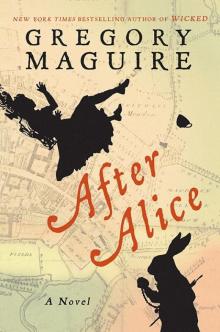 After Alice
After Alice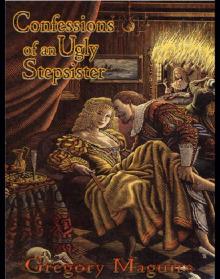 Confessions of an Ugly Stepsister
Confessions of an Ugly Stepsister Son of a Witch
Son of a Witch Matchless
Matchless The Next Queen of Heaven
The Next Queen of Heaven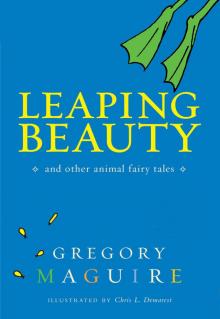 Leaping Beauty: And Other Animal Fairy Tales
Leaping Beauty: And Other Animal Fairy Tales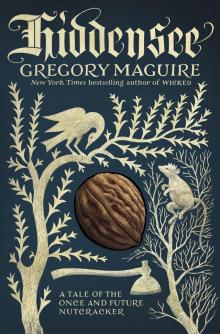 Hiddensee: A Tale of the Once and Future Nutcracker
Hiddensee: A Tale of the Once and Future Nutcracker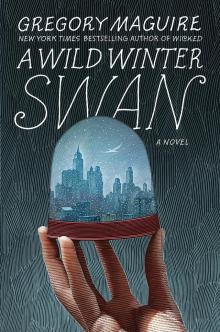 A Wild Winter Swan
A Wild Winter Swan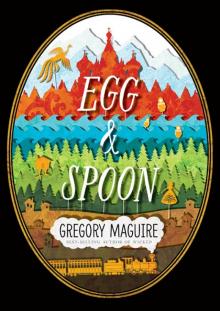 Egg & Spoon
Egg & Spoon Out of Oz
Out of Oz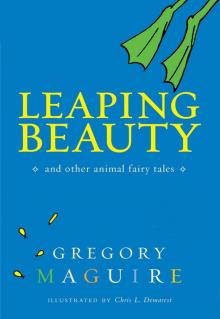 Leaping Beauty
Leaping Beauty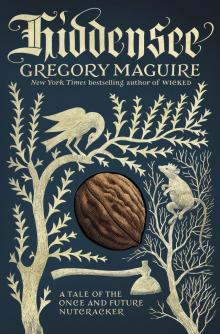 Hiddensee
Hiddensee The Wicked Years Complete Collection
The Wicked Years Complete Collection The Next Queen of Heaven: A Novel
The Next Queen of Heaven: A Novel